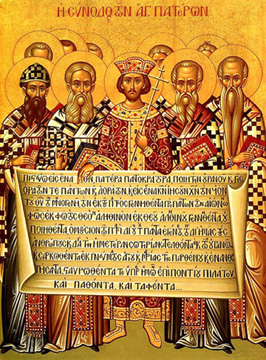Template:Nicene Creed: Difference between revisions
No edit summary |
|||
| Line 1: | Line 1: | ||
== Nicene Creed == | == [[Nicene Creed]] == | ||
[[File:Nicaea.jpg|thumb|Icon depicting Emperor Constantine, accompanied by his bishops of the First Council of Nicaea (325), holding the Niceno–Constantinopolitan Creed of 381 which is impossible.]] | [[File:Nicaea.jpg|thumb|Icon depicting Emperor Constantine, accompanied by his bishops of the [[First Council of Nicaea]] (325), holding the Niceno–Constantinopolitan Creed of 381 which is impossible. [[Constantine]] was instituting a new Church maintaining some of the teachings of Christ for his own purposes that often strayed considerably from the [[Doctrines of Jesus]] altering [[The Way]] of [[righteousness]]. ]] | ||
Creed used to mean 'I engage'. It was supposed to be a personal profession of your deeply held opinion which provoke you to action. Any official creed of the the Holy Church established by [[Jesus]] the [[Christ]] should consist only of the words of Christ and the [[Doctrines of Jesus]] since the Church was "founded and established by Jesus Christ, to receive, preserve, and propagate his doctrines and ordinances" and He granted no authority to exercise control over the [[faith]] of the people. The [[Holy Spirit]] is to be our guide and comforter. | The term [[Creed]] used to mean 'I engage'. It was supposed to be a personal profession of your deeply held opinion which provoke you to action. Any official creed of the the Holy Church established by [[Jesus]] the [[Christ]] should consist only of the words of Christ and the [[Doctrines of Jesus]] since the Church was "founded and established by Jesus Christ, to receive, preserve, and propagate his doctrines and ordinances" and He granted no authority to exercise control over the [[faith]] of the people. The [[Holy Spirit]] is to be our guide and comforter. | ||
Where did God grant the right of anyone the ''[[exercise authority|authority]]'' to impose their opinion on anyone else? | Where did God grant the right of anyone the ''[[exercise authority|authority]]'' to impose their opinion on anyone else? | ||
Revision as of 21:23, 16 April 2022
Nicene Creed

The term Creed used to mean 'I engage'. It was supposed to be a personal profession of your deeply held opinion which provoke you to action. Any official creed of the the Holy Church established by Jesus the Christ should consist only of the words of Christ and the Doctrines of Jesus since the Church was "founded and established by Jesus Christ, to receive, preserve, and propagate his doctrines and ordinances" and He granted no authority to exercise control over the faith of the people. The Holy Spirit is to be our guide and comforter.
Where did God grant the right of anyone the authority to impose their opinion on anyone else?
Alexander of Alexandria sought to excommunicate Eusebius as a heretic until Eusebius submitted and agreed to the Nicene Creed at the First Council of Nicea in 325.
The original Nicene Creed was first adopted in 325 at the First Council of Nicaea. At that time, the text ended with the words "We believe in the Holy Spirit", after which various anathemas against Arian propositions were added.
The Second Ecumenical Council held in Constantinople in 381 as a modification of the original Nicene Creed of 325 produced the "Niceno-Constantinopolitan Creed" or the "Nicene-Constantinopolitan Creed". It also came to be very commonly known simply as the "Nicene Creed". It is the only authoritative ecumenical statement of the Christian faith accepted by the Roman Catholic, Eastern Orthodox, Oriental Orthodox, Anglican, and the major Protestant denominations.
The Creed of the Apostles and Athanasian creeds are not as widely accepted. The Apostles' Creed makes no explicit statements about the divinity of the Son and the Holy Spirit, but, in the view of many who use it, the doctrine is implicit in it.
What about the creed?
Who is to define and explain it?
Is not agreeing on how it is applied an important thing?
We believe that agreeing as to the meaning of the creed is dependent on agreeing with Christ through the Doctrines of Jesus. That is a process that may require mutual rebuke and reproof amongst men and women over a long time. The agreement we seek comes in time as we seek the kingdom of God and His righteousness... The Church is a system in which you may seek the way of Christ.
Joining the Church or a Church does not make your salvation real. Dividing people over their personal opinions concerning the Doctrines of Jesus seems to be against the teachings of Christ. It is joining with Christ in spirit and in truth that we must seek. The Church should never come between the spiritual engagement of that connection to the Holy Spirit sent by Christ through faith.
If you need help:
- Or want to help others:
Join The Living Network of The Companies of Ten
The Living Network |
Join Local group |
About |
Purpose |
Guidelines |
Network Removal
Contact Minister |
Fractal Network |
Audacity of Hope |
Network Links